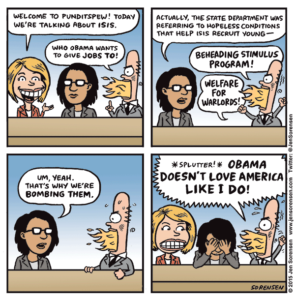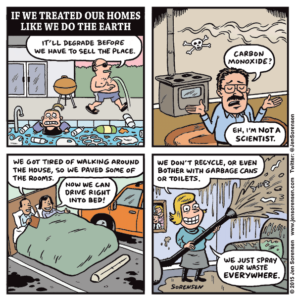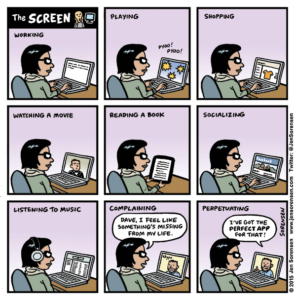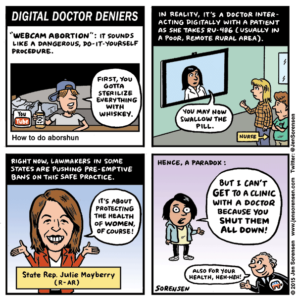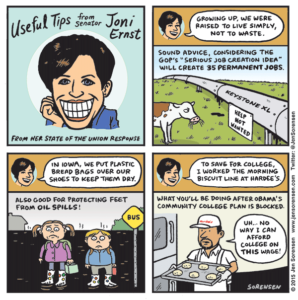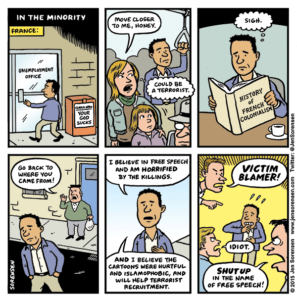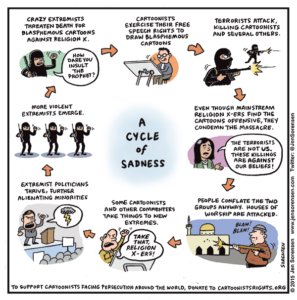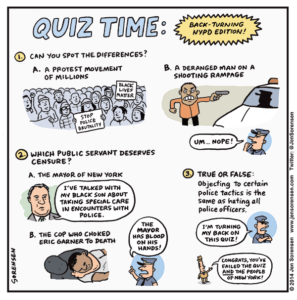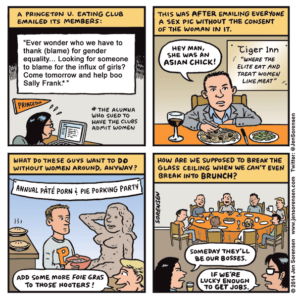The Sorensen Monologues
Punditspew: ISIS edition
The right-wing media has been having a field day over a State Department spokeswoman’s suggestion that merely killing ISIS isn’t going to solve the problem — that we also need to look at underlying causes of why some are drawn to terrorism. She was clearly suggesting that having decent jobs might prevent people from becoming terrorists. You can agree or disagree with this point, but it is dishonest and patently absurd to say that she is advocating jobs for violent jihadis.
The Screen
Who says the world isn’t flat? Sometimes I do miss the third dimension, though, with all those smells and tactile sensations.
Digital Doctor Deniers: The truth about so-called “webcam abortions”
The Arkansas House just passed a measure banning the safe practice of doctors interacting remotely with women taking RU-486. Similar uses of technology in the field of telemedicine have been around, and largely unquestioned, for decades. But in recent years, Republican lawmakers have suddenly expressed a curious concern for women’s safety when it comes to this particular usage. Pre-emptive bans are being passed in states where the technology has not even been used yet in conjunction with RU-486. It’s almost as if there’s something else going on here…
Useful Tips from Senator Joni Ernst
Freshman Senator Joni Ernst’s rebuttal to Obama’s State of the Union address provided me with some much-needed comic relief after the turbulent news of the past few weeks. Of course, it’s only funny until she starts doing the things she talked about.
While Googling images of a Hardee’s biscuit line, I realized that the restaurant chain has trademarked the phrase “made from scratch” with regard to said biscuits. They are Made from Scratch™. Now, I’m sure they are fine biscuits, but generally speaking, most things made from scratch don’t involve a federally-registered trademark saying so.
Hope you enjoyed the Hand-Drawn™ cartoon.
In the Minority
I spent a lot of time last week reading Muslim cartoonists’ responses to Charlie Hebdo, as well as interviewing some myself. Many hold complex views like the one in the fifth panel of this cartoon. All support free speech and deplore the attacks, despite having varied opinions on Charlie. Many operate under threats themselves. Some mention cartoonist Naji al-Ali, who was assassinated in London in 1987. Most Westerners don’t even know about this.
I haven’t seen any cartoons yet from the perspective of a French Muslim immigrant wrestling with these difficulties. One Charlie cover, in reference to killings of Muslims in Egypt during the 2013 coup d’etat, showed a Muslim man holding a Koran, both being sprayed with bullets under the caption “The Koran is shit.” Were this a Jew holding the Talmud, we would rightly recognize that as anti-Semitic. To say such a cartoon in this context is only about religious cosmology is a narrow, literalist interpretation worthy of our current Supreme Court. Religion and identity are hopelessly intertwined here, amidst a backdrop of history that hasn’t always been pretty.
I’ve seen a number of statements to the effect that we cannot — must not — talk about the Charlie Hebdo cartoons because that would be tantamount to blaming the victims. To be clear, I disagree with the Pope’s oddly-pugnacious phrasing that if one mocks religion, one can expect a punch. That’s a very unsettling way of putting it that excuses violent behavior. I do, however, agree with many Muslim cartoonists that we can blame the terrorists AND exercise our freedom of expression to talk about the cartoons. We can hold these two thoughts in our head. They are not mutually exclusive.
Announcing my new gig: Graphic Culture
 Some of you have noticed a lack of activity here on the blog, and later posting of cartoons than usual. This is because I have started working as Comics Editor for Fusion, a new media company from ABC and Univision. If you aren’t familiar with Fusion, it’s both a cable channel and digital news outlet aimed at diverse young adults. (It’s OK if you’re not a young adult — you can still enjoy it.)
Some of you have noticed a lack of activity here on the blog, and later posting of cartoons than usual. This is because I have started working as Comics Editor for Fusion, a new media company from ABC and Univision. If you aren’t familiar with Fusion, it’s both a cable channel and digital news outlet aimed at diverse young adults. (It’s OK if you’re not a young adult — you can still enjoy it.)
Last fall, we launched Graphic Culture, a collection of cartoons, comics, and longer-form graphic journalism pieces, as well as occasional animation and articles about cartoonists. The site is still in “Beta” — a whole new site, and Graphic Culture front page, is coming soon. But I invite you to check it out now. We’ve published lots of great stuff already, including this roundup Charlie Hebdo cartoons.
If you’d like to help out, please follow us on Facebook, Twitter, or Instagram. I’m very glad to be able to create new opportunities for cartoonists and bring new comics projects into the world.
So now you know why I haven’t been blogging much. I have a good excuse!
Shootings over cartoons: A cycle of sadness
Some people have misread this to think I am blaming the cartoonists for the attacks. That was not my intention at all; the terrorists are 100% to blame — it all starts with them. (I am probably more supportive of taking aggressive measures against ISIS than some of my peers.) What I am addressing are some of the vile comments and yes, a few very ugly, hateful cartoons against all Muslims that have come out over the past week in response to the shootings. All of this plays right into terrorists’ hands of baiting the West, stirring up culture war, and furthering their agenda of recruitment. I see a return to a Bush-era, post-9/11 mentality, and that’s a movie I just can’t stand to watch again. If a desire for de-escalation and greater distinction between terrorism and Islam makes me blasphemous, then maybe I am, in my own strange way, Charlie Hebdo.
Also: the use of “Religion X” was not done out of fear of terrorists, as some have suggested; that didn’t even occur to me. The cartoon is intended as a parable so that we can get around preconceptions.
When is torture torture?
It’s safe to say that if the acts described in the torture report had been committed against American troops, people like Dick Cheney would be singing a different tune.
Pride and Prejudice posters in Etsy shop
I’ve opened an Etsy shop for my “Pride and Prejudice Illustrated” posters. For those of you who are new to the blog, I was commissioned by NPR Books to draw Jane Austen’s “Pride and Prejudice” as a one-page comic for the 200th anniversary of the novel. Let me just say these are the perfect gift for the Jane Austen fan in your life. 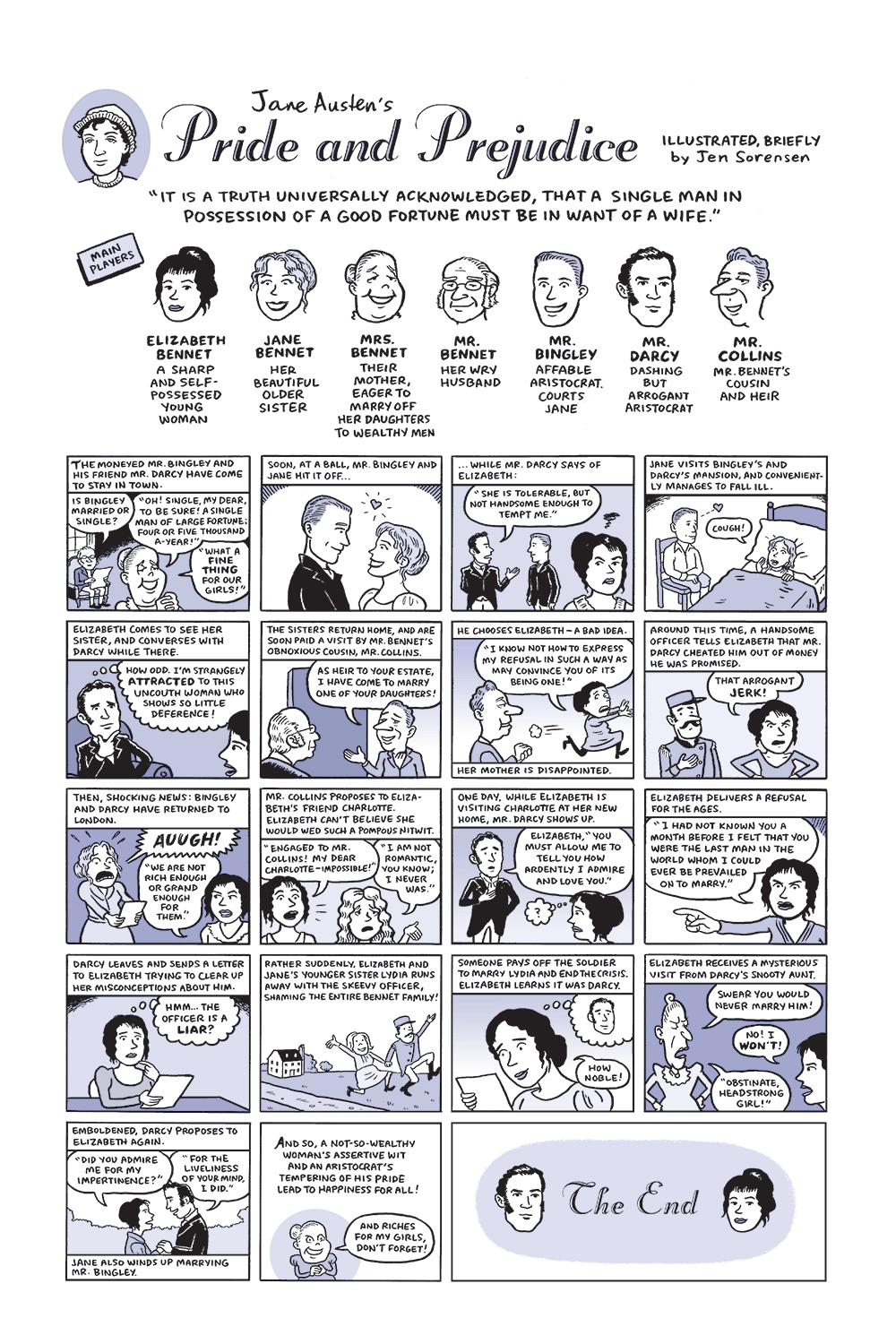
Yes, it’s the entirety of “Pride and Prejudice” condensed into one comic strip, printed on heavy paper stock with a soft, silky finish, and hand-signed by the cartoonist herself (er, me). Ships within 1-3 business days. Order now to get one by Christmas!
Exclusive dining in the Ivy League
Buried amidst discussion of another campus scandal last week was this mind-boggling report from the New York Times about a Princeton University eating club. The Tiger Inn, it turns out, didn’t admit women until 1991 — and only after the Supreme Court declined to hear their appeal. 1991! The year the Cold War ended! Which somebody apparently forgot to tell these guys, who seem to long for the Mad Men era.
One female Princeton alum who belonged to the Tiger Inn confirms this is pretty much the case.

